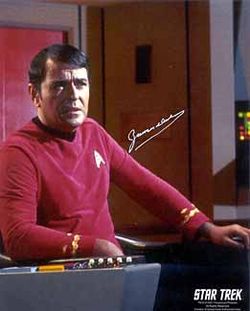 There are few programs on television today that inspire the minds of young people in science and engineering like the late Gene Roddenberry's Star Trek as documented in the the Discovery Channel's How William Shatner Changed the World. Shows such as Star Trek influenced a generation of scientists, but US science is on the decline with the share of scientific papers by Americans dropping seven percent between 1988 and 2001, and nearly two-thirds of of doctoral degrees in engineering going to foreign born students. Where are the engineering role models on television today?
There are few programs on television today that inspire the minds of young people in science and engineering like the late Gene Roddenberry's Star Trek as documented in the the Discovery Channel's How William Shatner Changed the World. Shows such as Star Trek influenced a generation of scientists, but US science is on the decline with the share of scientific papers by Americans dropping seven percent between 1988 and 2001, and nearly two-thirds of of doctoral degrees in engineering going to foreign born students. Where are the engineering role models on television today?Characters such as MacGyver and Montgomery Scott aka Scotty have been the quintessential role models for future engineers. Who can forget Scotty yelling over the Enterprise's intercom "I can't change the laws of physics! I've got to have thirty minutes," as he tried to hold her together or MacGyver destroyinng lasers with binoculars and cigarettes or building a rocket-propelled flare out of bamboo, fertilizer, matches, a strip of cloth, a small tin can, a thin metal rod, a funnel, and a wooden spoon?
Last year, Fox debuted Prison Break in which Michael Scofield, a civil engineer, creates an elaborate plan to break his brother out of jail after being sentenced to death for murder the Vice President's brother. Scofield uses detailed tattoos on his upper body containing blueprints and various other pieces of information in his escape. Another show that has recently premiered is Eureka on the Sci Fi channel. The premise of the show is that after World War II, then-President Harry Truman created a top-secret town in the Pacific Northwest where the country's greatest minds could work on scientific advancements without worries or distractions. The first episode introduces the audience to the character Henry Deacon, a jack-of-all-trades NASA engineer, masquerading as the local mechanic.
Some argue that shows such as CSI give unrealistic expectations about its field in science. But that hasn't deterred the increase in the number of students going into forensics-based based majors. West Virginia University has seen the number of students in forensics majors increase from three graduating in 2001 to 400 enrolled in 2004.
No comments:
Post a Comment